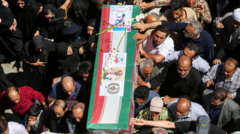In the aftermath of the conflict with Israel, Iran finds itself grappling with a complex array of possibilities and fears. The recent cease-fire has evoked a mix of hope and trepidation among Iranians, who reflect on the outcomes of the war and the subsequent state of their government. The Islamic Republic, still standing but weakened, faces critical decisions moving forward as its economy falters amid rising civilian casualties.
Iran on the Brink: The Aftermath of Conflict with Israel

Iran on the Brink: The Aftermath of Conflict with Israel
Iran faces an uncertain future following a 12-day war as the nation's internal and external challenges intensify.
On June 29, 2025, Roger Cohen reported from Dubai on the intertwining sentiments haunting both the diaspora and those living within Iran. Iranian-American journalist Roxana Saberi expressed her concern for the escalating turmoil while reminiscing about her own past experiences as a political prisoner. Similar fragmented emotions reverberate throughout the nation as calls for reform clash with fears for family and a desire for peace.
The conflict not only raised questions about Iran’s leadership but also prompted speculation about the potential for substantial change under the moderate President Masoud Pezeshkian's vision of progress amidst turmoil. The momentum from the war poses the possibility of a reevaluation of Iran’s governmental structure, which has long been marred by a repressive approach towards dissent.
Despite the United States’ minor involvement in the war, challenges remain for the Islamic regime. The conflict created a moment rife with potential yet fraught with danger, highlighting the precarious balance of political power in Iran. With the fate of Ayatollah Ali Khamenei untouched, calls for reform continue to echo loudly, as Iran stands on the edge of a pivotal juncture uncertain of its path ahead.
The conflict not only raised questions about Iran’s leadership but also prompted speculation about the potential for substantial change under the moderate President Masoud Pezeshkian's vision of progress amidst turmoil. The momentum from the war poses the possibility of a reevaluation of Iran’s governmental structure, which has long been marred by a repressive approach towards dissent.
Despite the United States’ minor involvement in the war, challenges remain for the Islamic regime. The conflict created a moment rife with potential yet fraught with danger, highlighting the precarious balance of political power in Iran. With the fate of Ayatollah Ali Khamenei untouched, calls for reform continue to echo loudly, as Iran stands on the edge of a pivotal juncture uncertain of its path ahead.





















